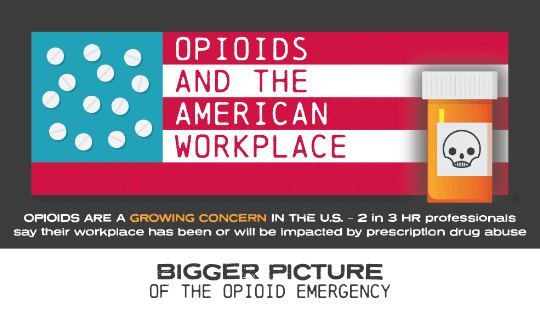Imagine this scenario: you go to the doctor and end up needing surgery. You get the surgery and you’re sent home with pain medication. You rest and recover and take your pain medication as prescribed. You go back to work after your recovery period, still using pain medication but otherwise ok. After a while you realize you’ve become dependent on the pain medication, but you don’t know what to do. If you have to go through a rehabilitation program you would have to take more time off from work, and you’re all out of sick days because of your surgery. You keep taking the pain medication to get by because you don’t have any other options. Eventually your doctor cuts you off, so you get pills from a relative or friend, then maybe you end up buying them online. Before you know it, you’ve been taking pain medication more than you ever thought you would and you’re afraid to get help because it might jeopardize your job.
This scenario is far more common than you think. The opioid crisis has grown exponentially over the past 20 years thanks to a combination of factors. Pain started being counted as a vital sign, consumer marketing of medications was deregulated, and pharmaceutical companies started working to ensure doctors that the risk of addiction to these medications was low.
By 2010, 20% of all patients who had a pain diagnosis received opioids for their pain. Between 2012 and 2016 opioid prescriptions fell by 20%, but by then the damage was done. In 2016, an estimated 12 million people in America misused prescription opioid pain medications, which is a leading risk factor in heroin use.
Unfortunately, 64% of HR professionals aren’t trained to help their co workers suffering from addiction. Typical workplace drug policies cover things like drug testing and drugs in the workplace, not how to help addicted coworkers get help. 71% of employers think that addiction should be treated like a medical condition, so what needs to change?
Instead of drug testing and firing suspected addicts, employers can provide a path to rehabilitation. Outlining a policy to fight addiction in the workplace gives people the incentive to come forward and ask for help when they get into a bad situation. Help with time off and paying for rehab are the first step toward healing, but also outlining a path back into the workplace after rehab can give extra assurances they are doing the right thing. Mentoring the recently sober can help them regain a sense of normalcy after such an ordeal.
Recall the situation at the beginning. Would you rather see your coworkers knuckle under when faced with an addiction they didn’t bring upon themselves or would you rather they knew immediately upon recognizing there was a problem that there was a way out? Putting more comprehensive workplace drug policies in place before it becomes an issue can help you save the next person.
Learn more about the opioid crisis and how employers can really fight back from the infographic below.



